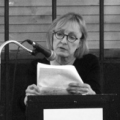Braddock Avenue Books: Stewart O’Nan correctly (we think) compares your writing to James Salter’s. I’m especially interested in the subtle shifting of POV. How did you come to this style and what effect do you think it creates for readers?
Christine Schutt: As it is in life often a relief to be in someone else’s company, so it is for me in writing a novel. I am relieved to change point of view and hope the reader feels the same way. Only in my stories and first-person first novel are there no such shifts, so it seems I came to this style over time.
BAB: Your characters seem to find or lose themselves in their sexuality. How have you come to understand the literary significance of sexuality and identity?
Schutt: “The fuck is your life,” so says the great Cheryl Strayed, and I agree with her. I can think of nothing else to say in defense of the characters in my fiction, but the fuck is the life or one hopes a large part of it.
BAB: Many of your characters resign themselves to the place they hold in others’ lives, especially women: Dinah to her husband, Sally to her father, even Isabel to Ned, a crafting of identity by juxtaposition—a position that seems to create, at best, feelings of ambivalence if not outright dysfunction.
Schutt: Chekhov’s short story “The Darling” is one that has had a long and powerful effect on me, and your question stirs up the truth of just how powerful an effect. I may have been unconsciously writing the same woman over and over again, my version of Sam Lipsyte’s “Gary,” but my intention in Prosperous Friends was to overturn female dependency and point to the prospect of women living together, victorious. For my present purposes, I want to write a story with a more obvious version of Chekhov’s darling, his Olenka, sister to John Cheever’s Joan Harris from “Torch Song.” These are the inordinately accommodating, attentive, imitative, empathetic women who represent life at the start of a romance but are death soon after, for as the men shrink, so such women grow stouter. You make me see that Dinah, Sally, Isabel are versions of Olenka, but with this significant difference: my women are not finally pinched out, diminished, destroyed by love. They may have been nurtured and bludgeoned by husbands and fathers, but at this juncture in the novel, when the three women are brought together, they are singers or women about to whistle. Sally and Isabel are dancing at the end of the novel. “They might be anything to each other.”
BAB: Clive is a fascinating figure in many ways. His actions and behavior—his whole life, really, seems to be guided by his “artistic” privilege. He is a famous painter, a man whose gravitational pull is so strong that he feels no particular interest in explaining himself. People—women, especially, should simply want to be with him, to give their lives to him.
Schutt: Surely you know men with similar expectations of adoration. Fairfield Porter, the painter, was one of my models, and his wife, Anne, a poet, gave me license in the making of Dinah. Other models abound: Robert Lowell to Elizabeth Hardwick; Hemingway to anyone. I also had in mind Hardwick’s essay, “Jane Carlyle,” a wrenching portrait of a brilliant woman’s sacrifices to a “gruff, self-absorbed, driven, intolerant” husband. Hardwick describes the marital arrangement: “It was still his right, his need to scream when the piano started up in the next house, to live out at home the appalling strains of his labors.” So Dinah and Isabel make themselves available to Clive in the service of art, although they have their own ambitions that go beyond oiling the wheels of the well-run home.
BAB: How do you understand the value of art in this book? Ned’s stories, which are largely ignored. His new memoir, which is coveted. Clive’s painting, where Isabel says that she looks like, “…a shrimp shape. Everyone’s face in the painting is merely a suggestion.”
Schutt: Fail at everything else if you must, but make something. Isabel is consumed with the subject of how to do it, where to do it, if to do it in this world of horrors. Isabel is looking out for models and Milton’s fairy dust. I write with some cynicism, perhaps, about the MFA program, of which I am a product and professor, but a remark such as, “You’ve a good name for a writer,” that remark and no other made in response to the proffered story is a gentler anecdote from the round table of the workshop. To the young writer it means, at the very least, temporary silence. Isabel has been made speechless to some degree by such a program, but the message she composes to herself in the course of the novel is finally to notice the birds—“She was sorry to have missed them in the first place”—and to respond to them in kind. What comes of the art made in the novel is what comes of art made in life, some modest assessment by friends. Clyde quotes Dinah to Dinah, which gives her great pleasure.

